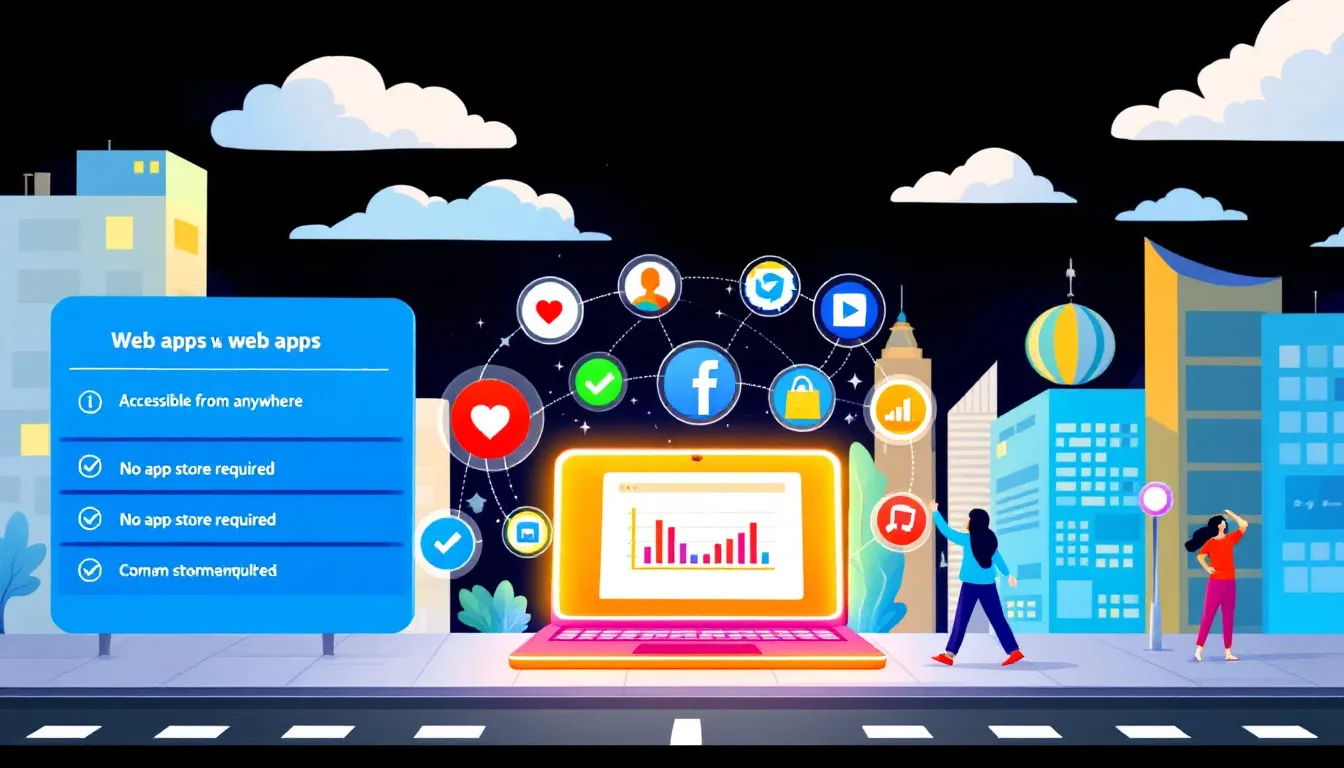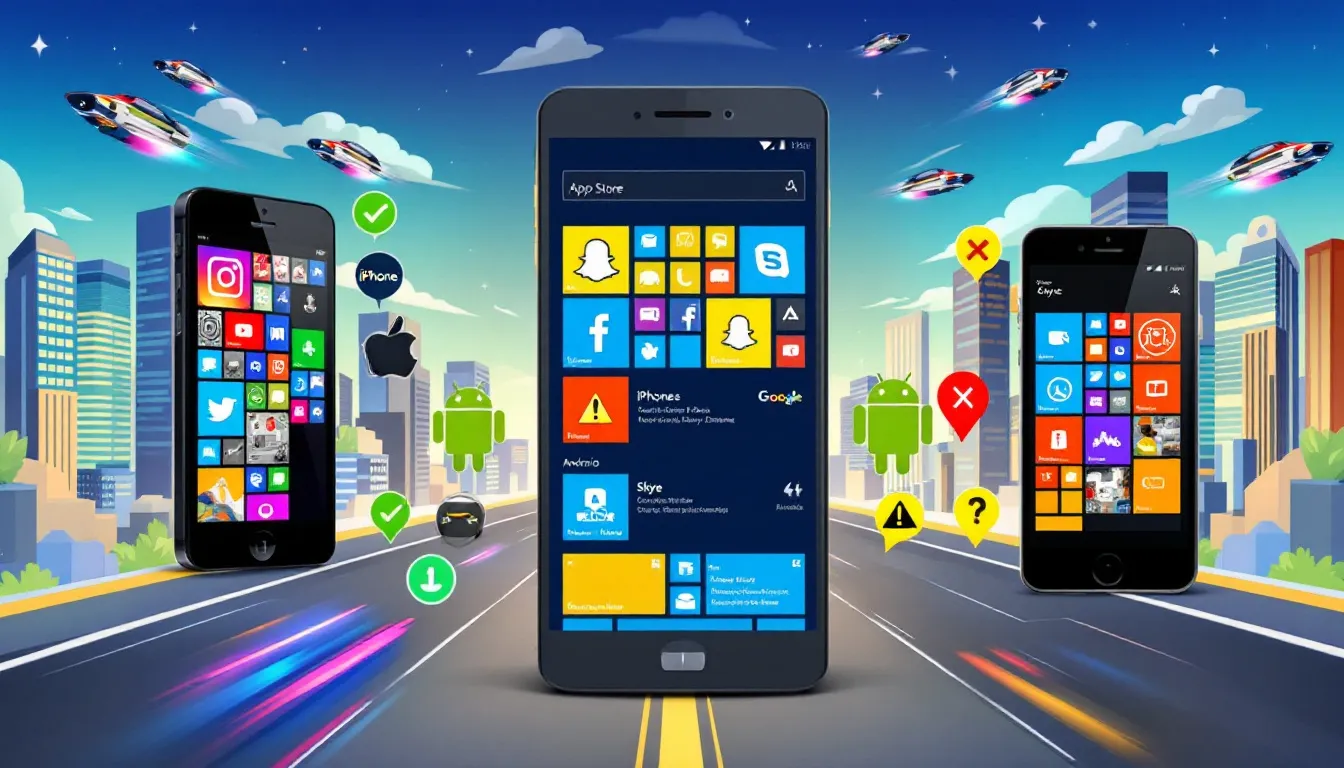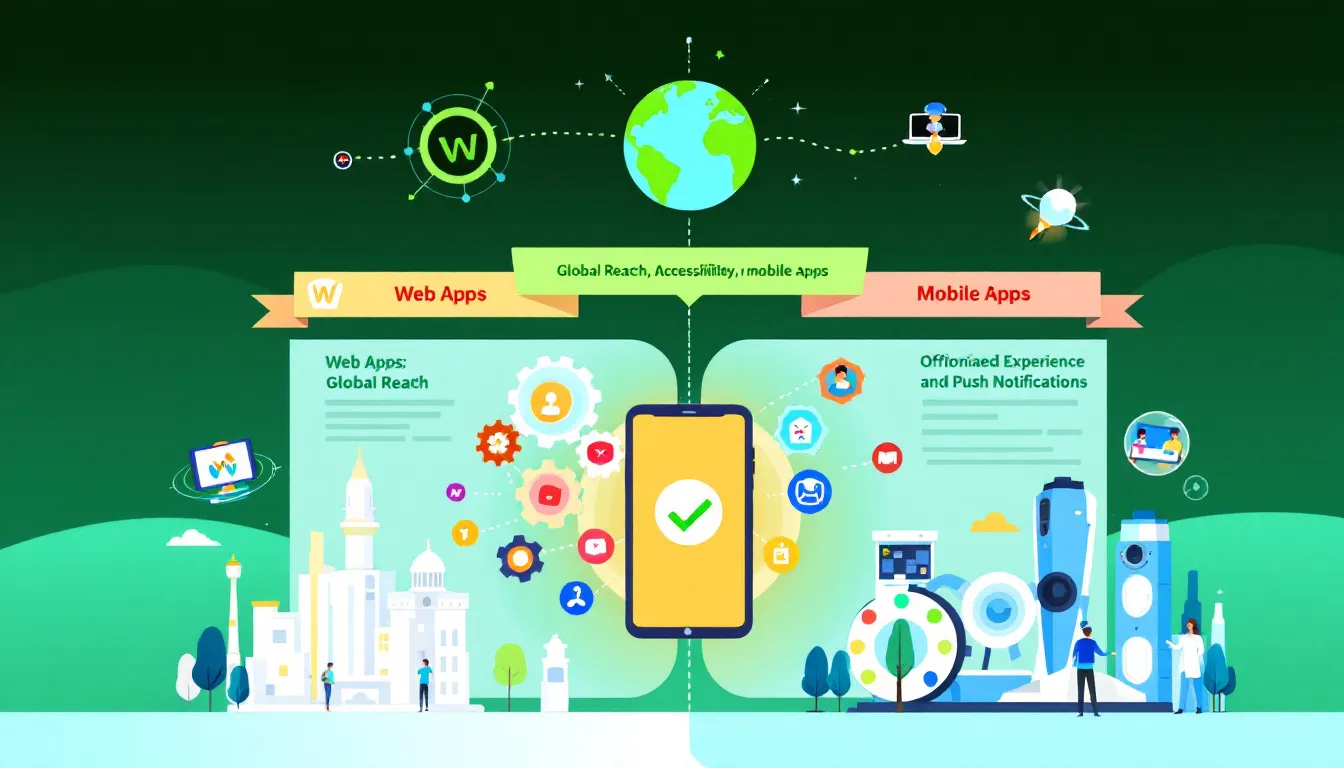

Web Apps vs Mobile Apps: Making an Informed Choice for Your Project 2025
Published on March 24, 2025
Written by Jaren Hidalgo · 10 minute read
Making the right choice between web apps vs mobile apps is crucial for your project’s success. Whether you opt for a web appor a mobile app, both can be developed using NoCode/LowCode solutions, streamlining the process and aligning with modern development trends. Web apps offer the convenience of browser access without installation, making them widely accessible. Mobile apps, installed directly on devices, provide enhanced integration with device features and superior performance. This article will explore these differences in detail, helping you determine which option aligns best with your needs, while also highlighting the efficiency of No
Key Takeaways
Web apps offer instant accessibility and lower development costs, making them ideal for projects with budget constraints and a broad reach.
Mobile apps provide superior performance and user engagement through direct device integration, making them suitable for applications requiring offline access and high interactivity.
Hybrid approaches, such as Progressive Web Apps, combine the benefits of web and mobile apps, offering cost-effective solutions with enhanced user experiences.
Overview
Choosing between a web app and a mobile app can significantly impact your project’s success. Each option offers unique advantages that align with various business needs and user expectations. Here are the key aspects of each to help you decide.
Choosing between web apps and mobile apps involves more than just technical differences. Factors like user behavior, feature requirements, development timelines, budget constraints, and the project’s long-term vision all play a role. This overview sets the stage for a deeper dive into web and mobile applications.
Understanding the Basics
Web apps are applications that run in web browsers, accessible from any device with an internet connection. They don’t require installation and can be updated centrally, making them ideal for building web apps.
On the other hand, mobile apps are installed directly on mobile devices and tablets, offering deeper integration with device features and potentially better performance for specific use cases. Recognizing these fundamental differences helps in making an informed choice.
Web apps offer the convenience of being accessible from any device, while mobile apps provide a more tailored experience by leveraging the full capabilities of the device.
Exploring Web Applications

Web applications run in web browsers and are accessed via the internet. One significant advantage is that they do not need to be downloaded and installed on devices.
Users access web applications through web browsers, requiring an active internet connection. This makes web apps instantly accessible and responsive across various devices, offering a seamless experience without the hassle of installation, whether it’s a quick utility tool or a complex business application.
Web apps can be more easily discovered through search engines, improving visibility compared to apps confined to app stores. This broader reach can attract a wider audience for businesses.
Exploring Mobile Applications

As mentioned before, mobile apps are installed on both mobile devices and tablets. They offer integration and performance levels that mobile and web apps often can’t match, leveraging hardware and software features like the camera and internet connection.
Popular mobile apps include platforms for social media, gaming, and banking. These applications are designed for specific mobile operating systems, such as iOS and Android. This specialization allows mobile apps to offer a more optimized and efficient user experience.
Installed directly on mobile devices, mobile applications have full access to features like the camera and GPS, enhancing their functionality. This deep integration makes them ideal for tasks requiring advanced features and high performance.
Key Differences Between Web Apps and Mobile Apps

Web apps run in browsers and are accessible on any device with an internet connection, while mobile apps are downloaded and installed directly on smartphones or tablets. This distinction affects development and user experience.
Developing web apps is generally faster and less costly due to a single codebase, unlike mobile apps that often need separate versions for different platforms. Updating web apps is simpler as changes are made on the server, whereas mobile apps require users to download updates.
However, mobile applications typically offer superior performance and responsiveness compared to mobile web applications. Mobile apps can utilize features such as location services and notifications, making them more engaging and consistent in user experience compared to web apps, which can vary based on the browser used.
Advantages and Limitations of Web Apps
Web apps are updated on the server, ensuring all users have access to the latest features without manual intervention. This ease of maintenance is a significant advantage. Additionally, web apps can be more easily discovered through search engines, improving visibility compared to app store-only apps.
Web apps require a consistent internet connection, which can hinder accessibility in areas with poor connectivity. Despite this, web applications offer a broader initial reach and lower development investment, making them a cost-effective choice for many businesses.
Advantages and Limitations of Mobile Apps
Mobile apps offer enhanced speed and efficiency, equipped with advanced functionalities and features. They provide deeper user engagement through features like push notifications and optimized user interfaces. Many businesses use mobile applications to send push notifications, enhance brand presence, and engage users.
Building and maintaining mobile apps can incur high costs, especially when supporting multiple platforms. Maintaining a mobile app is generally more expensive due to the need for platform-specific updates and user installations. Additionally, mobile apps must comply with accessibility standards, as they are considered places of public accommodation under the ADA (Americans with Disabilities Act), which ensures equal access for all users, including those with disabilities.
Despite these challenges, mobile apps provide benefits such as offline functionality and leveraging native features like GPS and camera. These advantages make mobile apps a powerful tool for businesses looking to offer a rich and interactive user experience.
When to Choose a Web App
When developing a web app, consider factors like budget, target audience, and required functionality. Web apps may be more cost-effective due to needing only a single platform, making them suitable for projects with budget constraints.
Understanding your target audience’s device usage is essential, as certain demographics may prefer desktop platforms. For projects requiring quick deployment and lower costs, web development is usually the preferred option.
When to Choose a Mobile App
Mobile applications enhance customer engagement by providing immediate access to products and services, allowing users to interact with brands conveniently. For applications requiring offline access, a mobile app is usually more effective.
Consider features unique to mobile devices, like geolocation and push notifications, when choosing between a web app and a mobile app. Mobile apps are beneficial when extensive integration with device hardware is necessary and are preferred when high performance and user experience are critical.
Hybrid Approaches: Combining Web and Mobile Apps

Hybrid approaches can incorporate both web and mobile applications, particularly through Progressive Web Apps (PWAs). PWAs work like web apps but can be installed on the home screen and provide offline functionality, offering an immersive user experience.
Developing hybrid apps can be faster and less costly than creating separate web and native app applications, although they might not use all native device features. This approach allows businesses to balance cost and functionality.
User Experience and Accessibility Considerations
User engagement strategies differ, with mobile apps typically allowing more direct re-engagement than web apps. The choice between a web app and a mobile app should be based on specific user engagement patterns; mobile apps are ideal for frequent daily use.
The Web Content Accessibility Guidelines (WCAG) apply to both web and mobile platforms, offering guidance on making apps accessible. Native mobile apps often provide the best user experience.
Development Considerations for Web and Mobile Apps
Web applications generally provide a quicker development timeline, suitable for businesses needing a fast launch. Developing a simple web app typically takes 1-4 months, while a complex one may take 4-12 months or more. Web apps have a single codebase for all platforms, leading to faster deployment cycles. These web apps can often be developed using NoCode and LowCode platforms, which further streamline the process and reduce development time and costs.
Performance may be limited in web apps compared to native apps, especially for resource-intensive tasks. Native apps generally provide faster performance than mobile websites due to local data storage. Compatibility issues can arise when developing apps for different operating systems like iOS and Android.
Launching mobile applications requires a separate app for each operating system and app store approval. Developers must consider browser compatibility issues when creating web apps, which can increase development time. Creating a mobile-optimized website can be a cost-effective strategy for startups.
Business Impact of Web and Mobile Apps

Mobile apps are essential for various activities, including communication, entertainment, and online shopping. Using mobile applications for loyalty programs encourages customer retention by rewarding repeat purchases and providing exclusive offers. Mobile apps can create a direct communication channel between businesses and customers, enhancing user engagement.
Accessible mobile apps help widen the target audience, potentially leading to increased sales and customer loyalty. Apps can lead to higher conversion rates in e-commerce by offering features like in-app purchases and streamlined navigation. Collecting user data through apps allows businesses to make informed decisions based on consumer behavior and feedback.
Having a mobile app can provide a competitive edge by showcasing a commitment to modern customer interactions. Unlike traditional stores, mobile apps offer non-stop operation capabilities, catering to customers regardless of time zones.
Choosing the Right App for Your Needs
The decision between mobile apps and web apps is pivotal, hinging on specific business goals and audience needs. Key considerations include understanding user preferences, the significance of device-specific features, and development objectives. For Minimum Viable Products (MVPs), the goal is to validate ideas swiftly and cost-effectively.
Businesses must grasp their users, product requirements, and overarching goals to determine the best approach. Often, a combination of both web and mobile apps is beneficial. The choice should factor in target audience preferences, necessary functionalities, available development resources, business objectives, and long-term scalability plans.
Whether you choose a web app, mobile app, or a hybrid approach, success relies on comprehending your users' needs and delivering value through the chosen platform. Many companies begin with a web app to validate their concept, then progress to a mobile app to enhance user experience and leverage native device functionalities. This strategic approach allows for initial idea validation, followed by enriched user interaction through deeper device integration. Consider starting with a smaller MVP to validate your approach before making a larger investment.
Need help deciding what’s best for your project? At Kreante, we specialize in both web and mobile app development using NoCode/LowCode solutions. Contact us for a free to discuss your project and find the best approach for your needs. To keep up with latest news and insights we invite you to visit our blog.
Summary
Choosing between web apps and mobile apps involves careful consideration of various factors, from budget and development time to user experience and functionality. Web apps offer the benefit of broader accessibility and lower costs, while mobile apps provide higher performance and deeper integration with device features.
Ultimately, the right choice depends on your specific business needs and goals. By understanding the strengths and limitations of each option, you can make an informed decision that aligns with your project requirements and delivers the best value to your users.
Frequently Asked Questions
What is the primary difference between web apps and mobile apps?
The primary difference is that web apps run in browsers and can be accessed on any internet-connected device, whereas mobile apps are specifically downloaded and installed on smartphones or tablets. This versatility of web apps makes them accessible anytime, enhancing your experience!
What factors should be considered when choosing between a web app and a mobile app?
When choosing between a web app and a mobile app, it's essential to consider user needs, device-specific features, and your development goals. This will help you make the best choice for your audience and project success!
Why is the decision between web and mobile app development particularly crucial for building a Minimum Viable Product (MVP)?
Choosing between web and mobile app development is essential for building an MVP because it helps you validate your ideas quickly and efficiently, ensuring that you make the most of your resources. By selecting the right platform, you can effectively reach your target audience and gather valuable feedback.
How do user environments influence the choice between web and mobile apps?
User environments greatly impact the choice between web and mobile apps, as users tend to prefer mobile apps for on-the-go tasks and web apps for more complex, desktop-centric activities. Embracing the right platform can enhance user experience and task efficiency!
What is a significant advantage of mobile apps regarding user engagement?
A significant advantage of mobile apps is their ability to enhance user engagement through features like push notifications and user-friendly interfaces. This keeps users connected and boosts interaction, making the experience more enjoyable.










